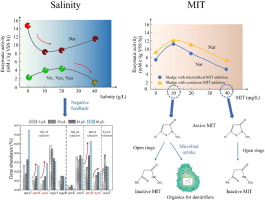Separation and Purification Technology ( IF 8.1 ) Pub Date : 2020-03-04 , DOI: 10.1016/j.seppur.2020.116799 Danfei Zeng , Kai Liang , Fang Guo , Yihui Wu , Guangxue Wu

|
Salinity and biocide in reverse osmosis (RO) concentrate can affect the subsequent biological treatment. Effects of salinity and methylisothiazolinone (MIT) on denitrification performance, denitrification genes and microbial community were investigated. The salinity from 10 to 40 g/L NaCl and 10 mg/L MIT did not have impact on denitrification. Nitrite reductase, nitric oxide reductase and nitrous oxide reductase could tolerate higher salinities than nitrate reductase. The salinity improved the gene abundances of narH, narI, norB and norC as a negative feedback towards unfavourable conditions. Both Thauera and Marinobacter possessed all denitrification genes with the highest abundance at 0-20 g/L and 20-40 g/L NaCl, respectively. Continuous or intermittent MIT addition at 10 mg/L did not affect the denitrification rate, whereas 40 g/L MIT inhibited denitrification. MIT degradation was attributed to both the reaction with intracellular thiols and the organics uptake by denitrifiers, thus low dosage could not exhibit the inhibitory effect. After a long acclimation with continuous MIT addition, microorganisms tended to have a stronger tolerance to MIT shocks. 10 mg/L MIT generally had no influence on the denitrification genes and relevant microbial community, but it still suppressed the denitrifier Halomonas and continuously adding MIT could inactivate the predator Micavibrio.
中文翻译:

盐度和MIT胁迫下反渗透浓缩液的反硝化性能和微生物群落
反渗透(RO)浓缩物中的盐度和杀生物剂会影响后续的生物处理。研究了盐度和甲基异噻唑啉酮(MIT)对反硝化性能,反硝化基因和微生物群落的影响。10至40 g / L NaCl和10 mg / L MIT的盐度对反硝化没有影响。亚硝酸还原酶,一氧化氮还原酶和一氧化二氮还原酶比硝酸还原酶具有更高的盐度。盐度提高了narH,narI,norB和norC的基因丰度,作为对不利条件的负面反馈。无论Thauera和Marinobacter拥有所有的反硝化基因,分别在0-20 g / L和20-40 g / L NaCl下具有最高的丰度。以10 mg / L连续或间歇添加MIT不会影响反硝化速率,而40 g / L MIT会抑制反硝化作用。MIT的降解归因于与细胞内硫醇的反应以及反硝化剂对有机物的吸收,因此低剂量不能表现出抑制作用。经过长期适应并连续添加MIT,微生物倾向于对MIT冲击具有更强的耐受性。10 mg / L的MIT通常对反硝化基因和相关的微生物群落没有影响,但是仍然抑制了反硝化剂Halomonas的生长,连续添加MIT可以使捕食者Micavibrio灭活。











































 京公网安备 11010802027423号
京公网安备 11010802027423号